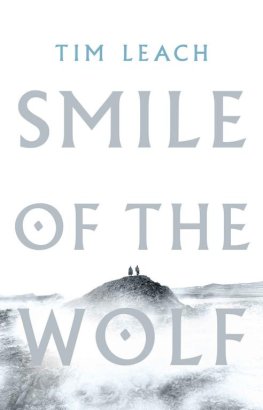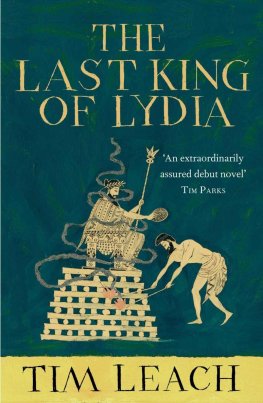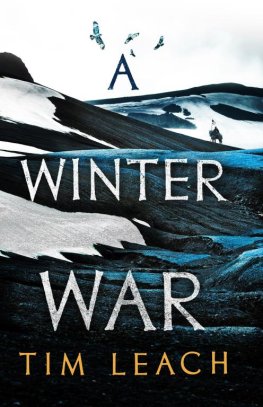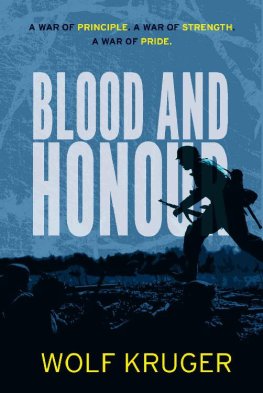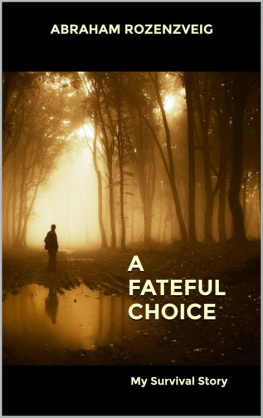Tim Leach
SMILE OF THE WOLF
The feud began in winter, when a dead man rose from the earth.
In the distant lands where men worship the White Christ, I have heard that a ghost is not such a dangerous thing. They are creatures of no substance, who may wail and howl but cannot hurt a man. But in my country, the people are warriors even in death. Our ghosts are not shadow and air, but walking flesh. They wield their weapons with as much strength as they did in life, and more bravely, for they have nothing left to fear. And so, when we heard that Hrapp Osmundsson had crawled from his grave and begun to wander his lands at night, no man in the Salmon River Valley would leave his house after dark without a good blade at his side and a shield on his arm.
In life, Hrapp had been the terror of his neighbours, ever covetous for their lands, their women, their blood. When the winter fever came on him and he knew he was soon to die, he commanded his wife to bury him upright beneath the doorway of his house, so that he could watch over his lands even in death.
Soon enough, the stories spread throughout the dale. Thord the Sly had gone to check on his sheep at night and been set upon by a dead man carrying an axe. Erik Haroldsson, a braver man, had grappled with the creature when it came for him, but was sent running for his life with the heavy tread of the ghost behind him.
No man sought to buy the farm from Hrapps widow. Indeed, there was talk amongst the neighbours of selling their own lands and moving on elsewhere, though there were few farmlands so prized in all of Iceland as those in the Salmon River Valley.
For all that was spoken of the ghost, I thought it mere winter talk at first, one of those foolish tales spun to pass the long cold months of near-permanent night, when men do little but huddle round their fires and drink mead, sing songs, tell stories and wait for the sun to return. I am a collector of such tales, yet I tell only the ones I know to be true or half-true at least. This ghost story held little interest for me.
But then one night I heard Olaf the Peacock speak of it when I visited his farm to trade milk for ale; he was an honourable man, a respected chieftain of the people, and he would never tell a lie. He said that he had seen the bruises on Eriks arms, and gone in search of the ghost himself. He had found it wandering Hrapps fields, bearing Hrapps old axe. Olaf cast a spear at it and the ghost had fled from him.
I wish he had not told me that. For it was then that I believed, and I began to tell the story myself.
*
I am Kjaran. Kjaran the Landless is what many call me, though some of the sharper-tongued call me Kjaran the Luckless, for they think it the worst of fates to be a man without land.
It is true, I am no man of property or wealth. My father was a slave gifted his freedom but nothing else, and so he had little to leave his children. But my voice is sweet and my memory is good, and I have always traded stories for food and songs for shelter. I am not one of the truly great skalds of this country, such as Kormkr gmundarson or Hallfred the Troublesome Poet. But I was not afraid to stand beside a friend in a feud when the odds were against him, and I never overstayed my welcome or chased after another mans wife (rare qualities in a poet, I know), and so I earned myself a good name amongst the people of this island. Twenty-four winters had I passed, the year the feud began.
I had spent that winter with the man they later called Gunnar the Killer, though he was merely Gunnar Karlsson when I met him, a farmer with a little land and a good-sized herd. I had spent the summer there, hunting for seals along the coast and helping to tend his sheep, for a humble skald earns favour with the sweat of his hands as much as the strength of his voice. But in winter it was the stories that I traded for shelter and food. And when I told Gunnar the story of the ghost, one late winter night, he said this:
So. The ghost fears a spear?
He did not speak in mockery or in doubt. He merely thought out loud, picking out the detail that, to him, seemed most important. That the ghost feared iron, and a man brave enough to face it.
He said nothing more for a time. We sat beside the embers of the cooking fire, his wife asleep at his feet, one of his children sleeping at mine. I had been his winter guest for many months and we had passed countless nights in this way. The taste of those nights is icy water and salted fish, the sound is the burning of the fire and the whistling of the wind, the smell is smoke and sweat and ash and earth. Now it was almost spring. The time of storytelling was almost over soon it would be the time to act.
Perhaps this thought was on Gunnars mind, too. For it was then, after the long silence, that he said: I will hunt this ghost.
I should not have been surprised. He had been a Viking in his youth, one of those restless men who took their due from the lands of the Saxons, the Scots, the Irish. But he had tired of the bloodshed, so he sailed his ship to these lands, broke it to pieces for timber, and built a house with that wood. He was a farmer, his ship forever stilled in the timbers of the roof above us, beached and capsized and never to sail again, his warring days long behind him. Yet killing is like any other art: when it is learned, it cannot be unlearned. Once learned, it will always long to be practised.
You believe the story that Erik has told you? he said. I have never thought him a trusty man.
No. But Olaf the Peacock would not lie to me.
He nodded. Will you come with me?
Why not? At the very least, it will make a good story for next winter. Maybe even a song.
He grinned at me. That it will.
Many men had gone hunting for ghosts in the past and had never caught them, for the dead only prey upon the unwary and flee the brave. But there was little enough to do on the farm. It would be a good excuse to go walking together in the night, for ale never tastes so good nor a fire feels so warm as after a winters walk. We would prove ourselves brave men who did not fear the dead, and I would make a song of it. There would be nothing more to it than that.
In the end, I did get my song. It was a good one, too, but not worth the price I paid for it. But I did get my song.
*
The loneliness of an Icelandic night how would I speak of it to one who was not of our people?
There is no place that is so lifeless, so isolated, as our island in the depths of a winters night. The scattered turf-walled houses all but disappear into the ground, looking more like hills or grave barrows than homes for the living. There is no movement in the fields. The herds are dead, butchered and salted for the winter, the few survivors huddled in the darkness of the barns. Out in the night, one can almost feel the land longing to return to desolation. The dead have more business here than the living.
We had set out in that half-light of late winter, a two-hour dawn that becomes a two-hour sunset with the sun barely above the horizon. For it is as the old song says: He must rise early, who would take anothers life. We had been merry as we trudged through the snow, heavy cloaks on our backs and weapons in our hands, singing together to keep the cold away. Yet the short day was almost spent by the time we reached Hrapps lands, the wind snapping and biting at us like an unseen spirit, and we circled his fields in silence. We no longer felt in the mood for song.
Soon Hrapps longhouse lurked before us in the half-light. The turf walls ragged after a winter spent untended, but still there was smoke rising from the chimney. Hrapps wife Vigdis lived alone now on the farmstead. Alone, save perhaps for a slave, a servant, or the company of the ghost.

